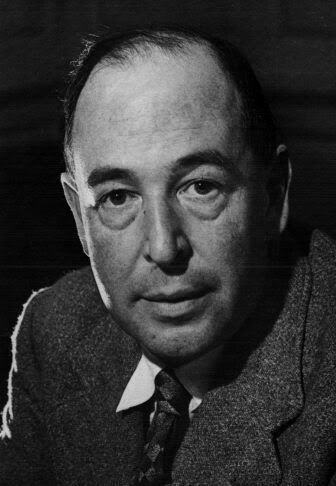I am always surprised at how truly and deeply interconnected my interests are. The other day it occured to me to do a bit of research into the connections between William Morris and C.S. Lewis. I've been a great fan of Lewis since I first read The Chronicles of Narnia as a young girl. My interest in William Morris began somewhat later. While I was familiar with his designs and political philosophy from reading books on the Pre-Raphaelites, it was not until my third year in university that I picked up a lovely 1905 edition of his poem The Earthly Paradise at a used bookstore in Olympia, Washington. Since then I have been enamoured with his imaginative writing and impressed with his ability to create modern quest-type fantasies well before they became widespread during the 20th century. Like Lewis and Tolkien, Morris was steeped in Norse and Arthurian legend and he created beautiful and mysterious fantasy novels that have retained popularity among fantasy readers in spite of intense criticism. While Morris prose abilities may have been limited, one can only imagine what he may have been able to produce had he focused on a single enterprise (writing) rather than choosing to develop such a myriad of talents (writer, designer, political activist).
The connection between C.S. Lewis and George MacDonald is well known and has been explored by many writers. However, William Morris' fiction was an important influence on the work of both C.S. Lewis and J.R.R. Tolkien (Tolkien acknowledged Morris' The House of the Wolfings and The Root of the Mountains as inspiration for The Lord of the Rings).
Lewis first read William Morris after borrowing a copy of The Well at World's End from his good friend Arthur Greeves. In Lewis' correspondance with Greeves, Morris is mentioned more frequently than any other author besides George MacDonald (75 times!). In his autobiography, Surprised By Joy, Lewis writes that Morris was his "great author" throughout his youth (source: The Cumberland River Lamp Post). C.S. Lewis later wrote two lectures on the subject of William Morris in which he defended Morris against his literary critics, arguing that "even the sternest of theories of literature cannot permanently supress an author who is so obstinately pleasurable" (source: J.P. Leishman, "Rehabilitation and Other Essays" The Review of English Studies, 1940). It has also been suggested by Robert Boenig that the character of Prince Caspian was in fact based on Morris' Child Christopher (link to article).
I'm excited to do some more research on the connections between Morris and Lewis. I've ordered an essay by Bruce Edwards entitled "Toward a Rhetoric of Victorian Fantasy Criticism: C. S. Lewis's Readings of George MacDonald and William Morris" which I hope to read very soon. I can't wait to share my findings!
The connection between C.S. Lewis and George MacDonald is well known and has been explored by many writers. However, William Morris' fiction was an important influence on the work of both C.S. Lewis and J.R.R. Tolkien (Tolkien acknowledged Morris' The House of the Wolfings and The Root of the Mountains as inspiration for The Lord of the Rings).
Lewis first read William Morris after borrowing a copy of The Well at World's End from his good friend Arthur Greeves. In Lewis' correspondance with Greeves, Morris is mentioned more frequently than any other author besides George MacDonald (75 times!). In his autobiography, Surprised By Joy, Lewis writes that Morris was his "great author" throughout his youth (source: The Cumberland River Lamp Post). C.S. Lewis later wrote two lectures on the subject of William Morris in which he defended Morris against his literary critics, arguing that "even the sternest of theories of literature cannot permanently supress an author who is so obstinately pleasurable" (source: J.P. Leishman, "Rehabilitation and Other Essays" The Review of English Studies, 1940). It has also been suggested by Robert Boenig that the character of Prince Caspian was in fact based on Morris' Child Christopher (link to article).
I'm excited to do some more research on the connections between Morris and Lewis. I've ordered an essay by Bruce Edwards entitled "Toward a Rhetoric of Victorian Fantasy Criticism: C. S. Lewis's Readings of George MacDonald and William Morris" which I hope to read very soon. I can't wait to share my findings!



6 comments:
Thanks, Meggie.
Let me know what you think!
- Bruce Edwards
Wonderful post, Meggy! I'm a long time fan of both W. Morris and C.S. Lewis too. Happy Week ((HUGS))
Why! I never knew this. Thanks so much for sharing this info!
Wonderful blog!
Sandra Evertson
Great post.Interesting blog - Im reading further! Im glad you left me a comment so I found you!
I recently had a chance to read the essay you mention. As Lewis wrote, 'Even the sternest theories of literature cannot permanently suppress an author who is so obstinately pleaseurable'.
If your'e interesting in the subject, there is also
http://www.thefreelibrary.com/Prince+Caspian+and+Child+Christopher+and+Goldilind+the+Fair-a0163972507
available online.
On a sidenote, as a recent pre-raphaelite convert (since my visit to the wonderful pre-raphaelite church in Rome!), I've come to really appreciate your blog here ( Although I can't stand Jane Morris myself ;) Great work!
Post a Comment